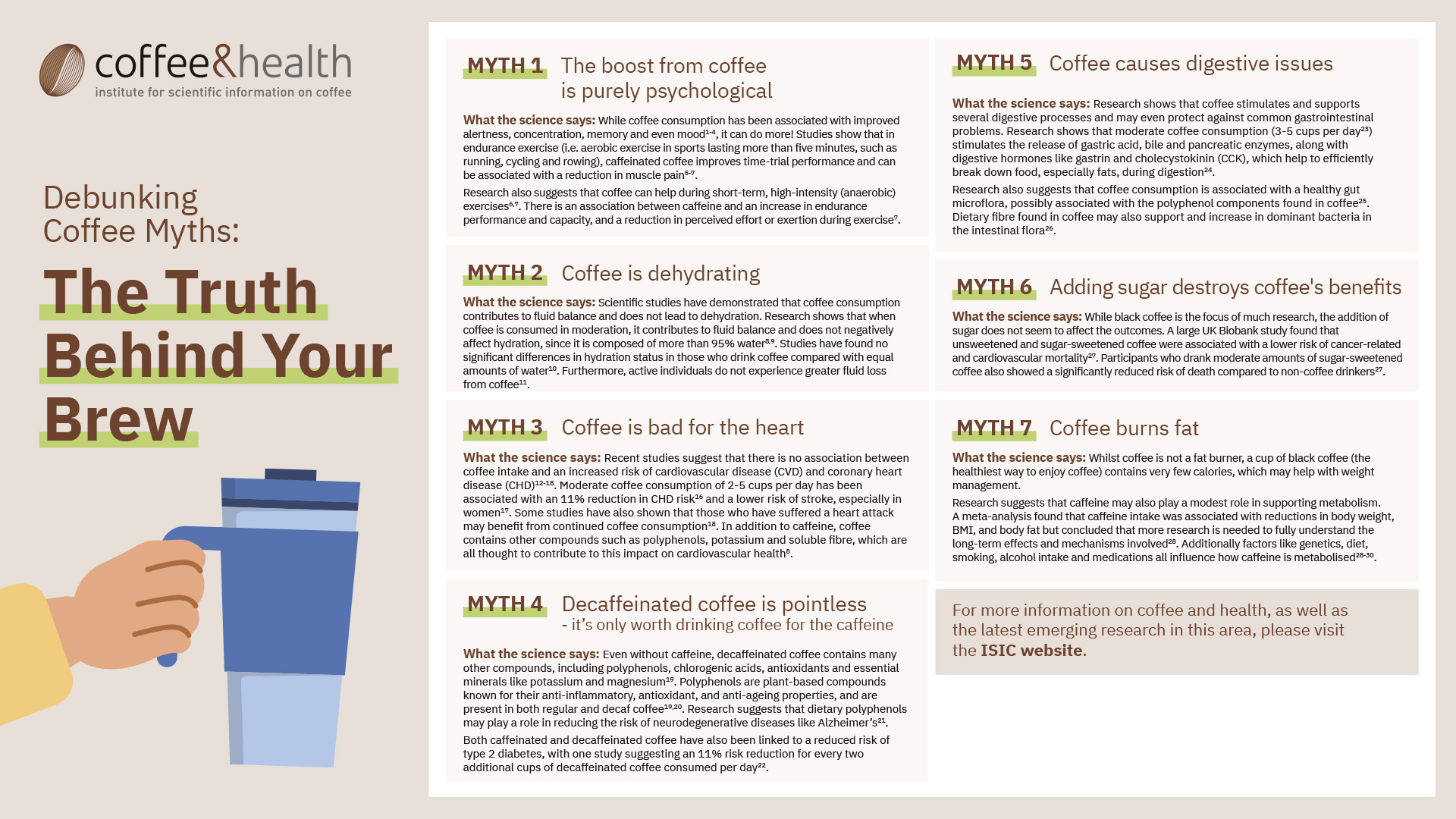MYTH 1: The boost from coffee is purely psychological
WHAT THE SCIENCE SAYS: While coffee consumption has been associated with improved alertness, concentration, memory and even mood1-4, it can do more! Studies show that in endurance exercise (i.e. aerobic exercise in sports lasting more than five minutes, such as running, cycling and rowing), caffeinated coffee improves time-trial performance and can be associated with a reduction in muscle pain5-7.
Research also suggests that coffee can help during short-term, high-intensity (anaerobic) exercises6,7. There is an association between caffeine and an increase in endurance performance and capacity, and a reduction in perceived effort or exertion during exercise7.
MYTH 2: Coffee is dehydrating
WHAT THE SCIENCE SAYS: Scientific studies have demonstrated that coffee consumption contributes to fluid balance and does not lead to dehydration. Research shows that when coffee is consumed in moderation, it contributes to fluid balance and does not negatively affect hydration, since it is composed of more than 95% water8,9. Studies have found no significant differences in hydration status in those who drink coffee compared with equal amounts of water10. Furthermore, active individuals do not experience greater fluid loss from coffee11.
MYTH 3: Coffee is bad for the heart
WHAT THE SCIENCE SAYS: Recent studies suggest that there is no association between coffee intake and an increased risk of cardiovascular disease (CVD) and coronary heart disease (CHD)12-18. Moderate coffee consumption of 2-5 cups per day has been associated with an 11% reduction in CHD risk16 and a lower risk of stroke, especially in women17. Some studies have also shown that those who have suffered a heart attack may benefit from continued coffee consumption18. In addition to caffeine, coffee contains other compounds such as polyphenols, potassium and soluble fibre, which are all thought to contribute to this impact on cardiovascular health8.
MYTH 4: Decaffeinated coffee is pointless - it’s only worth drinking coffee for the caffeine
WHAT THE SCIENCE SAYS: Even without caffeine, decaffeinated coffee contains many other compounds, including polyphenols, chlorogenic acids, antioxidants and essential minerals like potassium and magnesium19. Polyphenols are plant-based compounds known for their anti-inflammatory, antioxidant, and anti-ageing properties, and are present in both regular and decaf coffee19,20. Research suggests that dietary polyphenols may play a role in reducing the risk of neurodegenerative diseases like Alzheimer’s21.
Both caffeinated and decaffeinated coffee have also been linked to a reduced risk of type 2 diabetes, with one study suggesting an 11% risk reduction for every two additional cups of decaffeinated coffee consumed per day22.
MYTH 5: Coffee causes digestive issues
WHAT THE SCIENCE SAYS: Research shows that coffee stimulates and supports several digestive processes and may even protect against common gastrointestinal problems. Research shows that moderate coffee consumption (3-5 cups per day23) stimulates the release of gastric acid, bile and pancreatic enzymes, along with digestive hormones like gastrin and cholecystokinin (CCK), which help to efficiently break down food, especially fats, during digestion24.
Research also suggests that coffee consumption is associated with a healthy gut microflora, possibly associated with the polyphenol components found in coffee25. Dietary fibre found in coffee may also support and increase in dominant bacteria in the intestinal flora26.
MYTH 6: Adding sugar destroys coffee's benefits
WHAT THE SCIENCE SAYS: While black coffee is the focus of much research, the addition of sugar does not seem to affect the outcomes. A large UK Biobank study found that unsweetened and sugar-sweetened coffee were associated with a lower risk of cancer-related and cardiovascular mortality27. Participants who drank moderate amounts of sugar-sweetened coffee also showed a significantly reduced risk of death compared to non-coffee drinkers27.
MYTH 7: Coffee burns fat
WHAT THE SCIENCE SAYS: Whilst coffee is not a fat burner, a cup of black coffee (the healthiest way to enjoy coffee) contains very few calories, which may help with weight management.
Research suggests that caffeine may also play a modest role in supporting metabolism. A meta-analysis found that caffeine intake was associated with reductions in body weight, BMI, and body fat but concluded that more research is needed to fully understand the long-term effects and mechanisms involved28. Additionally factors like genetics, diet, smoking, alcohol intake and medications all influence how caffeine is metabolised28-30.





